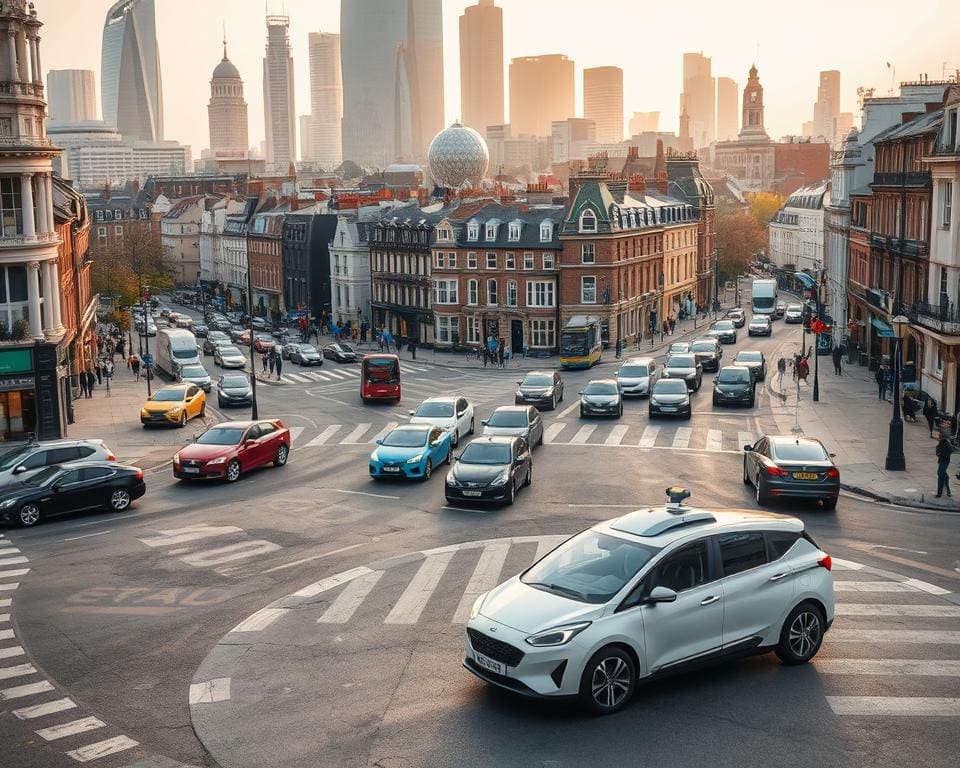The landscape of transportation in the United Kingdom is on the brink of transformation, with self-driving cars quickly moving from the realm of science fiction into reality. As technology evolves, the question arises: are self-driving cars ready for UK roads? With advancements in autonomous driving systems and a supportive legal framework, the future of automated driving in the United Kingdom is becoming increasingly plausible. Current statistics highlight the alarming number of accidents involving human drivers, underscoring the potential safety benefits that autonomous vehicles could offer. This section will explore these developments, providing insights into the readiness of self-driving cars in the UK and setting the stage for a deeper analysis of their integration into our daily lives.
The Rise of Autonomous Vehicles in the UK
The surge in interest surrounding the rise of self-driving technology in the UK marks a significant transformation in modern transport. Autonomous vehicles for British roads are becoming not just a concept but a reality. Government initiatives have laid a solid foundation, encouraging investment and innovation in this burgeoning sector.
Partnerships between key players, including major companies such as Waymo and Tesla, and public sectors have resulted in successful trials across the country. These collaborations aim to assess the safety and efficiency of autonomous systems in a real-world setting, ensuring that they can seamlessly integrate into existing traffic flows.

Dedicated testing zones have emerged to facilitate these advancements, providing controlled environments for further exploration of self-driving capabilities. This infrastructure development promotes a rigorous testing regime, allowing stakeholders to refine technology while ensuring public safety remains paramount.
The integration of electric vehicle technology into these autonomous designs further propels this movement forward. As energy efficiency becomes increasingly vital in combating climate change, the rise of autonomous vehicles for British roads serves not only to enhance mobility but also contributes positively to environmental goals.
Technological Advancements in Self-Driving Cars
The progress in technological developments in self-driving cars is nothing short of revolutionary. Engaging innovations in autonomous driving technology are at the forefront of this transformation, largely fuelled by breakthroughs in artificial intelligence and machine learning. These technologies enable vehicles to navigate complex environments, recognising obstacles and making real-time decisions that enhance overall safety.
One of the remarkable advancements comes from sensor technologies, especially the use of LiDAR and computer vision systems. These tools provide vehicles with the ability to perceive their surroundings with unparalleled accuracy. Companies like Audi and BMW have embraced these innovations, developing sophisticated systems that significantly improve the functionality of self-driving cars.
The integration of connectivity and data sharing further enriches these vehicles’ capabilities. Through constant communication with other vehicles and infrastructure, self-driving cars can optimise routes and enhance safety measures. This capability not only marks a significant step in the technological developments in self-driving cars but also promises a more efficient and safer driving experience on UK roads.
Are self-driving cars ready for UK roads?
The landscape of transportation is changing rapidly with the advent of self-driving cars. The potential impact on UK roads is significant, prompted by ongoing initiatives and innovations. Evaluating the readiness of these vehicles involves examining current testing of self-driving cars in the UK, alongside the key players spearheading this transformation.
Current Testing and Trials in the UK
Various trials have commenced across the United Kingdom, focusing on exploring the capabilities of driverless cars on UK highways. Locations such as Milton Keynes serve as testing grounds, where data is collected regarding urban traffic patterns and vehicle interactions. These trials aim to establish the operational readiness of self-driving cars, identifying potential challenges and refining the technology.
Key Players in the UK Market
The self-driving car market in the UK features a blend of established automotive brands and innovative start-ups. Companies leading the charge include:
- Jaguar Land Rover
- Ford
- Volkswagen
- Oxbotica
- Waymo
These organisations are collaborating with both private and public sectors, driving advancements in technology and engaging in extensive testing. Their efforts contribute to shaping a framework that supports the safe and effective integration of driverless vehicles into everyday life.
Safety and Regulations for Driverless Cars
The integration of driverless cars into daily British life relies significantly on robust safety standards for autonomous vehicles. Legislators and industry leaders are actively working to establish comprehensive regulations on self-driving cars in the UK that would govern their use and operation.
The UK’s Road Vehicle Automation (RVA) Committee plays a pivotal role in shaping these regulations. Composed of experts in various fields, this committee develops guidelines that emphasise public safety and outline necessary risk management strategies. Their goal involves ensuring that any autonomous vehicle circulating on British roads meets stringent safety criteria.
Agencies such as the Driver and Vehicle Standards Agency (DVSA) are instrumental in enforcing these safety protocols. They carry out assessments to ensure that manufacturers comply with established safety standards for autonomous vehicles before and after deployment. Public trust hinges on transparent oversight and adherence to safety regulations.
The ongoing dialogue between the government and technology providers aims to facilitate innovations while prioritising safety. By adapting existing laws to incorporate the unique challenges posed by self-driving technology, the UK sets a precedent for responsible automation. Only through rigorous evaluation and well-defined regulations can society fully embrace the myriad benefits of autonomous vehicles.
Public Perception of Autonomous Vehicles
The reception of autonomous vehicles across the United Kingdom reflects a complex landscape of hopes and concerns. Insights into public opinion on self-driving cars reveal varied attitudes towards their integration into daily life. Several surveys have been conducted to assess not only the acceptance of autonomous vehicles in the UK but to uncover the underlying anxieties that accompany this technological leap.
Surveys on Acceptance and Concerns
Numerous studies indicate that while a significant portion of the population displays a cautious optimism regarding self-driving technology, trepidations persist. Key findings from various surveys include:
- Approximately 51% of respondents exhibit a willingness to try self-driving cars, showcasing a budding acceptance among the general populace.
- Concerns about safety remain paramount, with 68% of participants expressing unease regarding potential accidents involving autonomous vehicles.
- Job displacement worry resonates strongly, especially among those employed in driving and logistics sectors, suggesting an apprehension about future employment prospects.
- Demographics play a vital role; younger individuals tend to show greater trust and excitement towards self-driving technology compared to older generations.
The dynamic interplay between acceptance of autonomous vehicles in the UK and public scepticism underscores the need for ongoing education and dialogue. As the landscape evolves, fostering a comprehensive understanding of this transformative transport modality remains essential.
Benefits of Self-Driving Cars for UK Roads
The integration of self-driving cars on UK roads presents a variety of impactful advantages for society. As autonomous vehicles become more prevalent, their benefits extend beyond mere convenience, potentially reshaping urban landscapes and enhancing the driving experience.
Reduced Traffic Congestion
One of the notable advantages of autonomous vehicles is their ability to communicate and coordinate with one another. This technology can lead to smoother traffic flow, as vehicles share real-time information about conditions ahead. The result can be a significant reduction in traffic congestion, alleviating the burden on busy roads and allowing for quicker journeys. Efficient routing will help minimise delays, enhancing overall productivity for commuters.
Environmental Impact
The environmental benefits of self-driving cars are equally compelling. With optimised driving patterns and the potential for fleets primarily composed of electric models, emissions reduction can be achieved. These vehicles can contribute to a greener future by decreasing air pollution and conserving energy. Additionally, the ongoing transition towards a greater number of electric autonomous vehicles supports sustainable practices, aligning with broader environmental goals for the UK.
The Future of Automated Driving in the United Kingdom
The future of self-driving cars in the UK is laden with potential, as advancements in the evolution of autonomous driving technology continue to reshape our transport landscape. With a significant move towards electric and sustainable transport solutions, the integration of self-driving vehicles promises not only to revolutionise personal commutes but also enhance public transport systems. This shift will likely reduce congestion and improve air quality, addressing key concerns for urban settings across the nation.
Experts predict that a collaborative approach will define the trajectory of automated driving. The combination of improved artificial intelligence capabilities and refined vehicle-to-infrastructure communication will be pivotal. These innovations will facilitate smoother interactions between autonomous vehicles and existing road systems, thus reinforcing the safety and efficiency of automated transport networks. Furthermore, investments in robust infrastructure are essential to fully embrace the future of self-driving cars in the UK and ensure seamless integration into everyday life.
The roadmap ahead suggests a cohesive blend of private and public sector initiatives aimed at fostering safe and responsible automation. As the discourse around self-driving technology evolves, keeping pace with regulatory advancements will be crucial. This holistic development is set to usher in a future where autonomous vehicles not only complement traditional modes of transport but redefine them, making mobility more accessible and environmentally friendly. The revolution in automated driving is certainly on the horizon, eagerly anticipated by both consumers and industry leaders alike.









